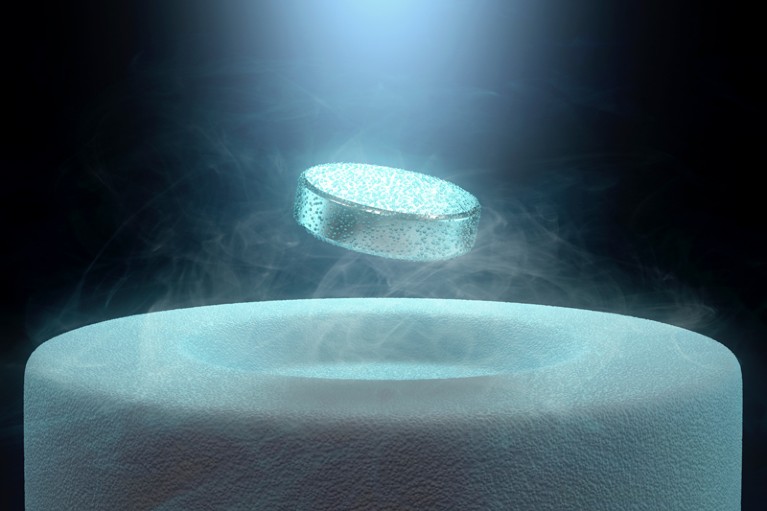Hello Nature readers, would you like to get this Briefing in your inbox free every day? Sign up here

A magnet levitating over a cryogenically cooled superconductor (artist’s concept).Credit: KTSDesign/Science Photo Library
Researchers have made a spectacular new claim: they say they’ve achieved room-temperature superconductivity, just months after they had to retract an electrifying paper in the same field. The group, led by physicist Ranga Dias, forged their superconducting material — nitrogen-doped lutetium hydride (LNH) — under extremely high pressures. They then lowered the pressure and raised the temperature, and saw superconduction at room temperature (294 kelvin, or 21 ℃) and a no-big-deal pressure of one gigapascal (around 10,000 times the atmospheric pressure at sea level). A material that can conduct electricity with zero resistance in easily attainable conditions would have countless applications — if it pans out.
Some physicists have greeted the announcement with apprehension. In September, the same team retracted a report of room-temperature (but high-pressure) superconductivity in a different material. And, over the past three years, Dias has been accused of scientific misconduct, which he calls “meaningless, baseless” assertions. And Dias has launched a start-up company, whose products are based on LNH, necessitating secrecy that will hinder efforts to reproduce the extraordinary claim.
Dig deeper into the research with physicists ChangQing Jin & David Ceperley in the Nature News & Views article (7 min read, Nature paywall)
US President Joe Biden has laid out broad funding priorities for his government, including big boosts for the National Science Foundation and the Department of Energy’s office of science. The budget emphasizes that Biden is committed to innovation in science and technology, with an eye towards being competitive with China and other parts of Asia, say analysts. The ultimate decision on the US budget will be made by Congress, and analysts predict a fraught process in the politically polarized chamber.
The US states of Texas and Florida are proposing legislation to slash funding for diversity, equity and inclusion (DEI) initiatives in higher education and to ban race- and gender-studies programmes. The move has triggered a variety of reactions from researchers in Florida, including frustrations over the bill’s unclear wording about applying for federal funding and worries about the state’s ability to attract top talent. Some scientists are persisting with DEI efforts, and others are considering moving away — despite concerns that other states will introduce similar bills.
Drunk mice sobered up quickly when given a dose of the hormone FGF21. In mice and people, the hormone is produced in the liver, where it helps to process alcohol. Mice that could not produce FGF21 stayed drunk longer than ones that could, and normal mice given an extra shot of FGF21 after an alcohol binge sobered up an hour and a half faster than those given a single dose. The hormone could one day be deployed as a treatment for alcohol poisoning, says biochemist and study co-author Steven Kliewer.
Reference: Cell Metabolism paper
Features & opinion
When vaccine-manufacturing specialist Piper Trelstad learnt that her management style wasn’t working for her team members, she felt like she’d been “hit by a truck” — but she was open with them about her efforts to change her approach. “I think it is important for leaders to show a level of vulnerability,” she says.
An unsung janitorial crew facesd a planet-sized challenge in the latest short story for Nature’s Futures series.
Large wildfires could expand and prolong the ozone hole as the smoke reactivates ozone-eating chlorinated chemicals. Scientists first realized this in the wake of the devastating Australian wildfires in 2019–20, when the chemistry of the sky above Australia became reminiscent of the Antarctic ozone hole. “It was as big of a wake-up call as I’ve had in my many years of studying this since the ozone hole was discovered,” atmospheric chemist Susan Solomon tells the Nature Podcast. If wildfires become more frequent with climate change, they could cancel out the hard work that the world has done to ban ozone-damaging chemicals.
Nature Podcast | 27 min listen
Subscribe to the Nature Podcast on Apple Podcasts, Google Podcasts or Spotify.

